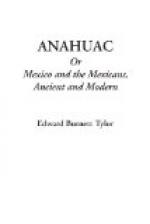In one house in the Floridan colony we found a menage which was surprising to me, after my experience of the United States. The father of the family was a white man, a Spaniard, and his wife a black woman. They received us with the greatest hospitality, and we sat in the porch for a long time, talking to the family. One or two of the mulatto daughters were very handsome; and there were some visitors, young white men from the neighbouring village, who were apparently come to pay their devoirs to the young ladies. Such marriages are not uncommon in Cuba; and the climate of the island is not unfavourable for the mixed negro and European race, while to the pure whites it is deadly. The Creoles of the country are a poor degenerate race, and die out in the fourth generation. It is only by intermarriage with Europeans, and continual supplies of emigrants from Europe, that the white population is kept up.
On the morning of our departure we climbed a high lull of limestone, covered in places with patches of a limestone-breccia, cemented with sandstone, and filling the cavities in the rock. All over the hill we found doubly refracting Iceland-spar in quantities. Euphorbias, in Europe mere shrubs, were here smooth-limbed trees, with large flowers. From the top of the hill, the character of the savannahs was well displayed. Every water-course could be traced by its narrow line of deep green forest, contrasting with the scantier vegetation of the rest of the plain.
As we steamed out of the river, rows of brilliant red flamingos were standing in the shallow water, fishing, and here and there a pelican with his ungainly beak. Our Chinese crew were having their meal of rice when we walked forward, and the national chopsticks were hard at work. We talked to several of them. They could all speak a little Spanish, and were very intelligent.
The history of these Chinese emigrants is a curious one. Agents in China persuade them to come out, and they sign a contract to work for eight years, receiving from three to five dollars a month, with their food and clothing. The sum seems a fortune to them; but, when they come to Cuba, they find to their cost that the value of money must be estimated by what it will buy. They find that the value of a black labourer is thirty dollars a month, and they have practically sold themselves for slaves; for there is no one to prevent the masters who have bought the contract for their work from treating them in all respects as slaves. The value of such a contract—that is, of the Chinaman himself, was from L30 to L40 when we were in the island. Fortunately for them, they cannot bear the severe plantation-work. Some die after a few days of such labour and exposure, and many more kill themselves; and the utter indifference with which they commit suicide, as soon as life seems not worth having, contributes to moderate the exactions of their masters. A friend of ours in Cuba had a Chinese servant who was impertinent one day, and his master turned him out of the room, dismissing him with a kick. The other servants woke their master early next morning, with the intelligence that the Chinese had killed himself in the night, to expiate the insult he had received.




